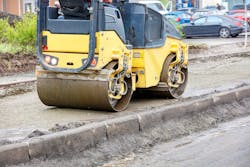Philadelphia is now required to install or repair 10,000 curb ramps on city sidewalks within the next 15 years following the final ruling in a federal class action settlement.
Originally filed over three years ago by a group of four disabled Philly residents and three disability rights organizations, the lawsuit stated that the city’s sidewalks were riddled with inaccessible barriers that violate the Americans with Disabilities Act (ADA).
The plaintiffs cited nonexistent or crumbling curb ramps, as well as unsafe sidewalks and alternate routes in construction zones as some of the issues faced by disabled residents and visitors.
This is not the first time the city has faced legal consequences for inaccessible pedestrian infrastructure. Curb ramps were regularly upgraded until 2014 following a case in 1993 when it was found liable for a lack of accessible sidewalks. Following 2014, a city program made it so the city was only required to make upgrades when if they were explicitly requested.
The United States District Court Judge on the case recently resolved the claims with his agreement of the settlement reached by both parties.
To fulfill the settlement, the city must install or repair at least 10,000 ramps while maintaining 2,000-ramp milestone every three years. Within the next 15 years, all ramps must be repaired or installed.
Missing curb ramps must be installed, and existing ones must be fixed if they are noncompliant with the ADA.
Following their installation, curb ramps will be maintained to ensure usability and ADA-compliance. The city has opted to start a Curb Ramp Request System which will allow residents to alert the city to repairs or remediation needed. Under the settlement, the city will be required to comply as quickly as possible.
The plaintiffs and advocates of the class action lawsuit feel confident that the agreement will produce meaningful improvements to the city’s infrastructure, as well as community life for Philadelphia residents with disabilities that impact their mobility.
"This settlement marks the beginning of holding the city of Philadelphia responsible for accessible sidewalks," plaintiff Tony Brooks said in a press release. "I am happy that the city has committed to installing, fixing, and maintaining curb ramps in communities in which we live, making sidewalks safer for the disabled community throughout Philadelphia."
Following the case’s finalization, Philly must begin fulfilling its obligations as soon as possible without further objection from either party.
--------------------------------
Source: PhillyVoice



